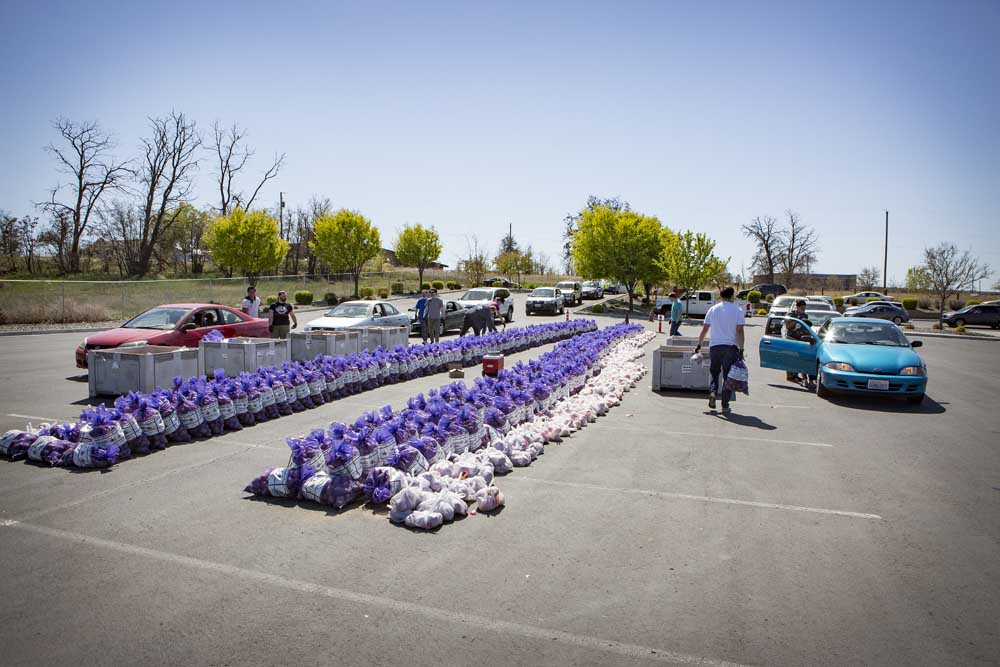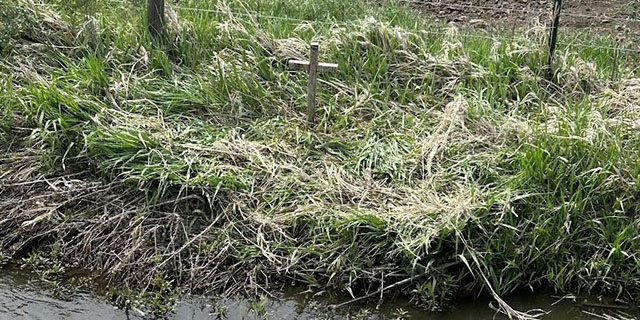Farmers adjust as pandemic changes what people eat
Published 7:00 am Saturday, April 18, 2020

- Rows of free 20-pound bags of potatoes and 5-pound bags of onions from AgriNorthwest and River Point Farms sit ready for distribution at The Church of Jesus Christ of Latter-day Saints in Hermiston on Friday afternoon.
HERMISTON — When the COVID-19 pandemic changed life in the United States, it changed what people eat, too.
The sudden, unexpected shifts in demand caused by people eating at home more often have left some farmers in a difficult position.
“Potatoes, onions, milk are all taking a beating,” said Pat Tolman, vice president of AgReserves, the parent company of agricultural holdings that include AgriNorthwest and River Point Farms outside Hermiston.
The farms’ customers include restaurant chains, but with restaurants closed or doing reduced sales via takeout, Americans are eating far fewer onion rings and French fries than normal. Tolman said processing plants in some parts of the country are struggling to stay open, adding volatility to the market.
Corn has also taken a hit, as ethanol plants that previously converted corn into fuel have shut down as demand and prices for fuel have dropped. Milk is in lower demand from restaurants and schools, while fruits and vegetables seem to be a “mixed bag,” Tolman said.
He said the bright spot in the industry might be wheat, which is doing well as quarantined Americans are alleviating boredom by baking. Flour is hard to find on grocery store shelves, but the nature of agriculture is such that a new crop can’t be produced in a day or two, just like it is too late for some farmers to change what they planted.
“Some farms, because of their normal rotation, have been able to make adjustments,” Tolman said. “Others already had plants in the ground, and that puts them in a very difficult position.”
On Friday, a line of vehicles stretched down Southeast Ninth Street and part of Highland Avenue in Hermiston as people lined up to get a free 20-pound bag of potatoes and 5-pound bag of onions from AgriNorthwest and River Point Farms.
Area farms that are part of Farmers Ending Hunger have also pledged to double donations to the Oregon Food Bank this year.
Reports of destruction of milk, eggs, animals, potatoes, onions and other products by farmers in some parts of the country has caused outrage by people who wonder why food is going to waste when unemployment is skyrocketing and people are struggling to feed their families. But farmers featured in such stories have defended the practice, saying in many cases there are logistics that stand in the way of donating their product to food banks.
With milk, for example, most dairies don’t pasteurize the milk themselves, meaning they would have to donate it raw, which would be a health hazard. They also don’t have packaging capabilities for take-home portions, and most food banks have limited refrigeration capacity.
At Threemile Canyon Farms outside Boardman, the farm’s diversity of operations has allowed it to make adjustments.
General Manager Marty Myers said some fields that would have grown produce that are now in low demand will instead be used to grow feed for the cows on the farm’s dairy side. In normal circumstances, the farm would purchase that feed from elsewhere and save that land for more lucrative crops.
“We’re fortunate to have the dairy business also,” he said.
Myers said Threemile Canyon Farms isn’t having to dump its milk down the drain.
The farm serves Tillamook’s Boardman plant, and dairies that sell to retail businesses instead of restaurants or schools are doing better than the ones that were supplying now-shuttered operations. Myers said even on the restaurant side, things aren’t as bad with milk as they are with some products.
“A lot of milk goes into cheese for pizza, and a lot of those services have adapted with delivery,” he said.
Myers noted the next problem farmers will start facing is on the meat side. Major meat-packing plants have started having to close due to outbreaks of COVID-19 among staff.
“That is a bottleneck,” he said.
That issue is playing out in Umatilla County’s backyard. Walla Walla County Department of Community Health said in a news release Friday that a Tyson Fresh Meats plant there has seven employees who have tested positive for COVID-19, including one who lives in Umatilla County.
The release stated that all of the employees developed their symptoms before April 8, and the company has since stepped up its mitigation efforts.
“To date, Tyson leadership at every level has been engaged and cooperative,” the county stated. “However, if at any point we see they are not implementing efforts to fidelity, we will take further action and potentially close the plant until it is safe to reopen.”
For growers whose biggest crops come later in the year, there are still a lot of unknowns about what prices and demand might look like.
Don Walchli of Walchli Farms in Hermiston said COVID-19’s effect on the demand for watermelon, or the labor to harvest it, is a “tough question.”
“It’s hard to say because we’re not in full swing on that side. … Just like everyone else, we’ll have to wait and see,” he said.
At the Hermiston Agricultural Research and Extension Center, interim director Clive Kaiser said there have been a few experiments that have been put off because they aren’t hiring their usual help for the summer, but faculty are still doing “really good work.”
“Everything we’re doing is really closely aligned with what the growers want. We haven’t heard they want anything different,” he said. “The demand is not going away for good agricultural research.”
He said they’re making health and safety a priority at the station, with protective gear, telecommuting and new social distancing policies limiting labs and vehicles to one person at a time.
2 lbs potatoes
1 large onion
1/3 cup olive or vegetable oil
Salt and pepper
2 cups of shredded cheddar or pepper jack cheese
Preheat oven to 450°. Slice potatoes lengthwise into strips roughly an inch thick. Slice onion into strips as well. Place potatoes and onion into a 9×13 casserole dish. Drizzle oil over the top and add salt and pepper (or other favorite seasonings that go well with potatoes). Mix until vegetables are coated. Cover with aluminum foil and bake for 35-40 minutes until potatoes are soft. Remove foil and sprinkle cheese over the top. Bake for about five more minutes until cheese is melted.





